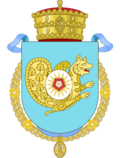Monarchy of Vardana: Difference between revisions
| Line 62: | Line 62: | ||
| [[File:Lauren Bacall 1998.jpg|100px|center]] | | [[File:Lauren Bacall 1998.jpg|100px|center]] | ||
| 7 April 1980 | | 7 April 1980 | ||
| [[Junia family|Junia]] | | [[Junia family|Junia]] | ||
| descendant of [[List of Vardanan monarchs|Basileus]] [[Manuel II of Lihnidos and Vardana|Manuel II]] (1785–1788) | | descendant of [[List of Vardanan monarchs|Basileus]] [[Manuel II of Lihnidos and Vardana|Manuel II]] (1785–1788) | ||
| [[Michael Pinarius (born 1959)|Michael Pinarius]] | | [[Michael Pinarius (born 1959)|Michael Pinarius]] | ||
|- | |||
| '''[[Basil II of Aretias]]''' | |||
| [[File:Basil II of Aretias.jpg|100px|center]] | |||
| 19 November 2002 | |||
| [[House of Bznuni-Kamytzes-Artavazd|Bznuni]] | |||
| descendant of [[List of Vardanan monarchs|Basileus]] [[Manuel II of Lihnidos and Vardana|Manuel II]] (1785–1788) | |||
| [[Princess Georgia of Aretias]] | |||
|- | |- | ||
| '''[[Anastas, Despot of Derzene]]''' | | '''[[Anastas, Despot of Derzene]]''' | ||
| Line 81: | Line 88: | ||
|- | |- | ||
|} | |} | ||
==Seat== | ==Seat== | ||
Revision as of 04:53, 23 March 2020
| Monarchy of Vardana | |
|---|---|
 Royal Coat of arms | |
 Stepan IV | |
| Details | |
| Style | His Apostolic Majesty |
| First monarch | David I |
| Last monarch | Stepan IV |
| Formation | 18 January 1009 |
| Abolition | 9 December 1923 |
| Residence | Lauseion, Leonopolis |
| Appointer | Hereditary |
| Pretender(s) | disputed |
The Monarch of Vardana ruled at various stages from the establishment of the Kingdom of Vardana, in 1009, until its dissolution, in 1923, and the revolution. Intermittently, the rulers of Vardana paid tribute or were vassals of neighboring realms, such as Thraysia. It was succeeded by various petty kingdoms, which continued to claim the Vardanan crown until they were themselves conquered or overthrown.
The monarchy was restored in 1900 when the Iotophan kingdom reconquered much of Vardana's core territories, but was ultimately overthrown as part of the Vardanan Revolution of 1923. The longest reigning dynasty of Vardana was the House of Artavazd, ruling from the 13th century until the 18th century, though a cadet branch continued to rule Vardana until 1830. All monarchs of Vardana descend from David I of Vardana, though some direct lines have ended.
Currently there are no fewer than five chief pretenders to the vacant throne of Vardana.
History
Various ancient kingdoms controlled what is now Vardana since before the 2nd century BC, often referred to as Urartu. Though it did not claim domain over all Vardana, the first iteration of Vardana was Greater Vardana, which was established following the abandonment of Perateia by the ancient Latin Empire in the 6th century AD. This kingdom's independence was short lived, eventually falling under the suzerainty of the Bayarid Empire. It continued to pay tribute to the Bayrids until the empire's demise and the rise of David Manavazean, who became the first Basileus of Vardana in 1009.
The Manavazean dynasty reigned until 1266 when it married into the Artavazd dynasty, who ruled until the kingdom's demise through a cadet line, in 1830. The Artavazds are regarded as the most important dynasty in Vardanan history. In 1694, Manuel I became Basileus of Vardana and King of Lihnidos, ushering in a 136 year personal union between the two realms. This period of Vardanan history is known as Xanthi Vardana, earning its name from the ruling House of Xanthi. While still a line of Artavazd rulers, the dynasty adopted the name Xanthi from its main seat in Lihnidos from which it ruled.
In 1830, the personal union ended with the death of Manuel III and the Lihnidosi rebellion. The dissolution of a united Vardana saw the realm split into petty states, the most prominent of which continued to claim the defunct titles of Vardana.
Full title
Until the dissolution of the monarchy in 1830, the full title of the monarch of Vardana was:
[Name], by the Grace of God, Basileus of Vardana, of Aparan, of Sophene, of Kajnadzor, of Armavir, and of Ayrum, King of Tayk, Grand Prince of the East, First Venerable One, Bridger of Seas, Master of the Periclean and the Ozeros, Sovereign Ruler and Lord of the Scipian Provinces and the lands in between, Duke of Alba, Protector and Defender of the Apostolic Faith.
Current claimants
The dissolution of the Monarchy of Vardana resulted in numerous successor states, the most prominent of these continued to claim the mantle of Vardana. All claimants were related to the last monarch, Basileus Manuel III, by blood or the Houses of Artavazd and Xanthi.
| Pretender | Since | House | Claim | Heir apparent | |
|---|---|---|---|---|---|
| Aram, Prince of Bayazet | 9 June 1966 | Hazarasp | descendant of Basileus Stepan IV (1920–1923) | Prince Ardil Hazarasp | |
| Stella II of Lihnidos | 27 November 2007 | Vasiliou | descendant of Basileus Manuel II (1785–1788) | Princess Efthymia, Duchess of Rhithasa | |
| Christina, Despotissa of Mysia | 7 April 1980 | Junia | descendant of Basileus Manuel II (1785–1788) | Michael Pinarius | |
| Basil II of Aretias | 19 November 2002 | Bznuni | descendant of Basileus Manuel II (1785–1788) | Princess Georgia of Aretias | |
| Anastas, Despot of Derzene | 22 April 2004 | Tornikian-Artavazd | descendant of Basileus David V (1642–1666) | David of Derzene | |
| Natan, Despot of Tayk | 1 December 2001 | Tsaghkadzor | descendant of Basileus David VI (1666–1699) | Zoravar of Tayk | |
Seat
The seat of the Vardanan monarchs from 1009 until 1699 was Leonopolis, with its chief residence changing over time. Aparan Palace in the Aparan district held the distinction of being the longest used residence and oldest palace still extant in the city. From 1699 until 1830, [Palace] in Xanthi, Lihnidos served as the chief royal residence, while Lauseion in Leonopolis remained the monarch's chief residence in Vardana.




